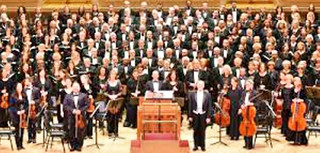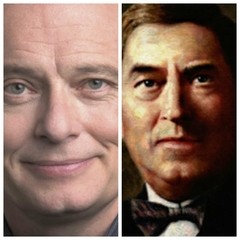|
Back
The Power and the Glory New York
Cathedral of St. John the Divine
11/05/2019 -
Sergei Rachmaninoff: Vespers (First six sections of Midnight Vigil), op. 37
Maurice Duruflė: Requiem, op. 9
Kirsten Solleck (Contralto), John Riesen (Tenor), David John Pike (Baritone)
Arthur Fiacco Jr. (Cellist), David Briggs (Organist)
Oratorio Society of New York, Kent Tritle (Conductor)

Oratorio Society of New York (© Courtesy of the Artists)
“The pursuit of the beautiful was, for [Duruflé], a gesture of the soul, not merely a function or an exercise of musical giftedness, or even of liturgical necessity. That is, perhaps, what Mme Duruflé meant in saying that he had... a Gregorian soul.”
James E. Frazier, Maurice Duruflé: The Man and His Music
Though I’ve never encountered blessings from church, mosque or synagogue, last night was a revelation. After all, it was (A) the Oratorio Society of New York, (B) conducted by Kent Tritle, ( C) performing Sergei Rachmaninoff’s Vespers (D) in the deep and resonant caverns of Cathedral of St. John the Divine.
The result was more than a blessing. It was a mitzvah and a few Subhan Allah as well.
First, obviously for the liturgical radiance of the music. And second (gulp), because there won’t be any need for any Messiah or Passion this season. The Oratorio Society of New York took care of religious radiance for the whole year and more.
The Oratorio Society program was two-part. The first Vespers were the first six sections of Rachmaninoff’s all-night Midnight Vigil sung in Old Slavonic, with chants lifted from the original Byzantine Church modalities, written eight centuries back in Constantinople’s Hagia Sophia Cathedral. And while the composer had never entered a church since his childhood, he felt it was one of the greatest works he had ever composed.
The second offering also used chants. These, though, were Catholic Gregorian, for the Maurice Duruflé Requiem.
No two works could be more contrasting, though a Merciful God would shrug ”Vive la differénce.” The French Requiem breathed perfumes and balsam woods, with contrapuntal fragrances of lilacs and jasmine. One could imagine Maurice Duruflé sitting on a sunlit balcony in Provence humming and notating his music.
Rachmaninoff’s Vespers would be in the hellish darkness of the Russian Orthodox church, the audience surrounded by stifling frankincense, by the smoke of candles as thick as a Cossack’s arm, by the rustling of ebony cassocks and an imaginary scintilla of putrefaction somewhere in the dank corners.
And then came the music by the Oratorio Society, and all thoughts of lilacs and corpses and smoky fragrances were vaporized into a major musical epiphany.
After all, nothing is minor about the Oratorio Society of New York. They were created a decade after Abraham Lincoln, should celebrate 150 years soon, their 100-plus singers have led New York’s (and America’s) choral scene. Most important, with Mr. Tritle at the helm, quality and quantity are equal. With the right venue, their voices soar as with as much glory as any British Edwardian mega-choir. And last night, their venue was ideal.

K. Tritle/M. Duruflė (© Jennifer Taylor)
The Vespers was—I discovered in the program notes yesterday—purposely written without choral counterpoint or accompaniment in order that the words be clear to the congregation. Not that the Old Slavonian would be clear to many in St. John the Divine last night, but following the original at times in the program, one heard those words come out sharply and clearly.
This was faultless intonation, impeccable precision, and—thanks to Mr. Tritle—a balance between the different vocal consorts. In an orthodox Orthodox setting, no women would be allowed, and the dark harmonies of an all-male choir would have its own mystical import. The Russian composer, by adding females, enabled a more colorful palette, but a greater challenge.
To wit: how to transubstantiate a choral celebration into a celebration of religion.
In this, Mr. Tritle offered a deep and abiding commitment. The one solo, by soprano Kirsten Solleck, was impressive (more about her later). Yet it was another moment, the moment when John Riesen’s tenor voice rose literally from the inner voices of the choir that one realized how religion, mysticism and great art coalesced.
The Oratorio Society didn’t need counterpoint. They gave a huge—I mean huge—tapestry of voices. Their repetition of Alliluya was a thing of angelic wonder. One wished that they had performed the whole Midnight Vigil in one mammoth sweep. But practicalities called for an intermission of schmoozing and greeting etc etc. I ignored the babble. sunk into my book (a history of Ukraine, appropriately both Catholic and Orthodox), and waited for the Catholic section of the evening, Duruflé’s Requiem.

D. Briggs
The Frenchman had written it in three versions including orchestra, but this one—for chorus, soloists, cello and organ—was transported to the top thanks to organist David Briggs. Mr. Briggs, as arranger, composer and performer, is possibly the world’s most celebrated. And—to use an organist phrase—he pulled out all the stops in this performance.
He could have been accompanist here, but instead let his great instrument play out from the most tranquil sections of the Pie Jesu to a Berlioz-like thundering in Libera me. (The latter including the Dies Irae.)
His splendor was needed as a foundation for the performance, since the Requiem in this version is a fairly intimate work. The last time I heard it, an orchestra was used, and the brass gave more revelatory image.
The sheer visual size of the New York Oratorio Society forces, spread out across the wide chancel, made one worry that the music would be overwhelmed by the visual magnificence. But Mr. Tritle and Mr. Briggs kept the music relatively in check.
Rather than power, the group conveyed the lyricism. The joy of the Kyrie, the sensuous harmonies of the Agnus Dei and the exaltation of the sopranos in the Sanctus.
Baritone David John Pike was dignified enough though one felt he wanted to allow more spiritual emotion. The genius of Maurice Duruflé was adding a solo cello to soprano Solleck’s precise (if somewhat bland) solo, and Arthur Fiacco’s playing was a delight.
This listener, granted, had great respect for the Requiem. That, though, was secondary. The power of Rachmaninoff’s Vespers transcended mere respect, becoming instead a monument to the ear and the spirit together.
Harry Rolnick
|